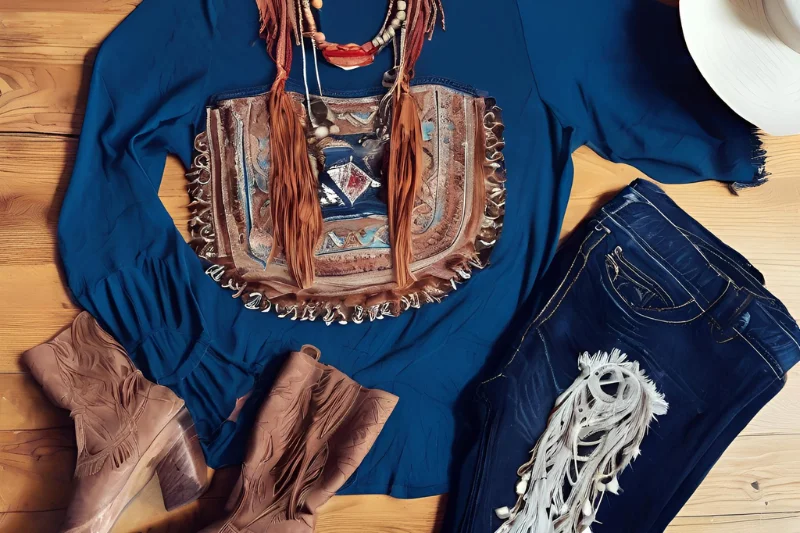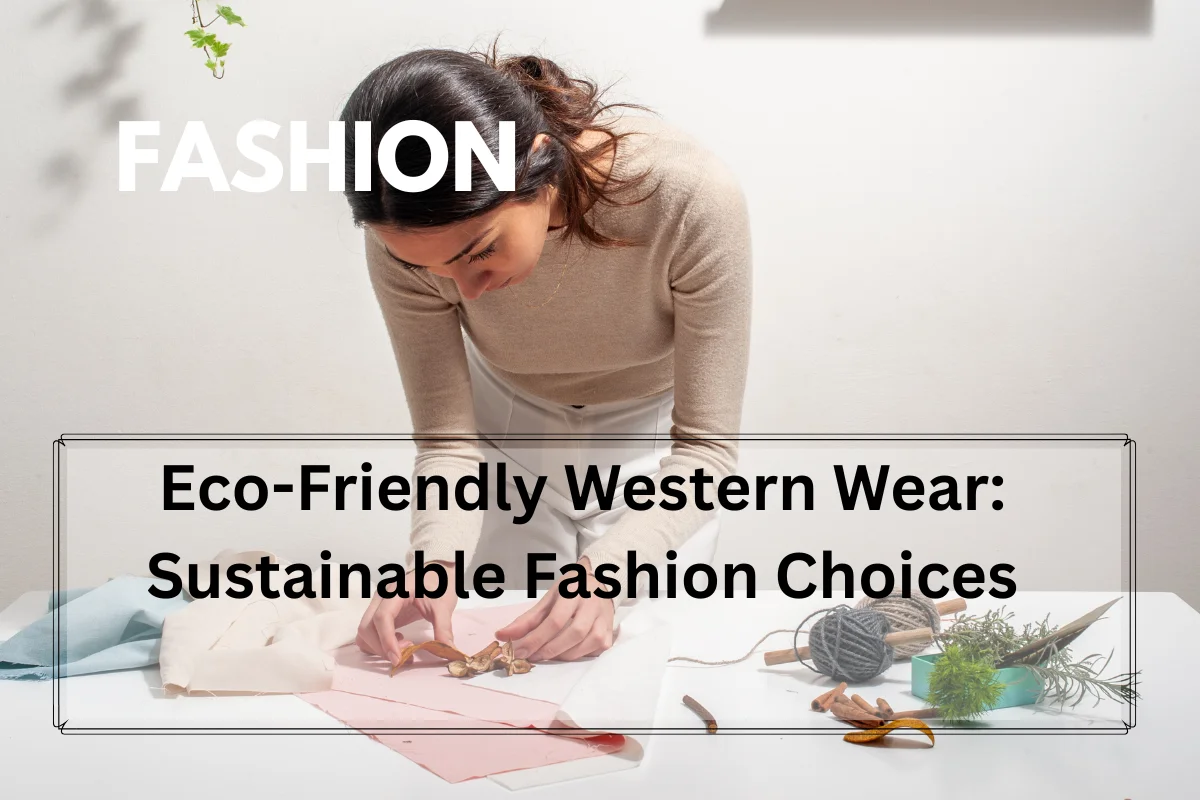In today’s world, fashion is more than just looking good it’s about making responsible choices that positively impact the planet. As the industry shifts toward sustainable alternatives, Eco-Friendly Western Wear: Sustainable Fashion Choices are gaining momentum. From denim jeans made with organic cotton to vegan leather boots and recycled fabrics, the modern wardrobe is evolving to reflect both style and sustainability.
In this blog, we explore what eco-friendly western wear is, why it matters, and how you can embrace it without compromising on style or comfort.
What is Eco-Friendly Western Wear?
Eco-friendly western wear refers to clothing and accessories inspired by traditional western styles—like denim, boots, fringe jackets, and cowboy hats—that are made using sustainable materials and ethical production methods. These pieces reduce environmental impact through lower water usage, biodegradable or recycled materials, and fair labor practices.
This approach blends timeless western fashion with the pressing need for sustainability. By choosing Eco-Friendly Western Wear: Sustainable Fashion Choices, you’re embracing a greener lifestyle without giving up your favorite fashion statements.
Why Choose Sustainable Fashion?

The fashion industry is one of the largest contributors to global pollution. Fast fashion, in particular, is responsible for massive water waste, toxic chemical runoff, and exploitative labor. Choosing sustainable alternatives helps:
- Reduce environmental damage from harmful dyes and chemicals.
- Support ethical labor practices and fair wages.
- Minimize textile waste by encouraging quality over quantity.
- Promote healthier choices for both people and the planet.
Eco-friendly fashion isn’t just a trend it’s a necessity.
Key Elements of Eco-Friendly Western Wear
If you’re ready to make the shift toward sustainability, here are the key elements to look for in Eco-Friendly Western Wear: Sustainable Fashion Choices:
1. Organic and Natural Fibers
Look for clothes made from organic cotton, hemp, bamboo, or TENCEL™. These materials are biodegradable and require fewer pesticides and less water than conventional cotton.
- Organic Denim: Jeans made with organic cotton and dyed using low-impact dyes are a staple in sustainable western wear.
- Linen Shirts: Lightweight, breathable, and made from flax, linen is a perfect eco-friendly fabric for western-style button-downs.
2. Recycled and Upcycled Materials
Western wear made from recycled denim, plastic bottles, or upcycled vintage pieces helps reduce waste and gives old garments a new life.
- Recycled Jackets: Fringe jackets or denim coats made from repurposed materials offer style and sustainability.
- Patchwork Skirts and Dresses: Made from leftover fabrics, these pieces are both unique and planet-friendly.
3. Vegan and Cruelty-Free Leather Alternatives
Skip traditional leather and opt for plant-based or synthetic leather made from pineapple leaves (Piñatex), apple peels, or mushroom-based materials.
- Vegan Boots: Stylish cowboy boots made without animal products are now widely available.
- Sustainable Belts and Bags: Add eco-conscious flair to your outfit with accessories made from cork, jute, or recycled rubber.
4. Ethical Manufacturing
Check for transparency in sourcing and production. Brands that disclose where and how their products are made often support fair wages and safe working conditions.
- Fair Trade Certifications: A mark of commitment to ethical labor.
- Local Artisans and Handmade Pieces: Support small-scale makers who use sustainable practices.
How to Style Eco-Friendly Western Wear
You don’t need to overhaul your wardrobe overnight. Start by mixing sustainable pieces with what you already own. Here are some ideas:
Casual Cowgirl Look
- High-rise organic cotton jeans
- A vintage graphic tee
- A secondhand leather belt
- Vegan suede boots
Boho Western Vibes

- Flowy TENCEL™ maxi dress
- Recycled denim jacket
- Handcrafted earrings from fair trade artisans
- Straw hat and thrifted boots
Modern Rodeo Ready
- Button-down hemp shirt
- Fringed upcycled vest
- Apple leather western boots
- A cork clutch bag
By combining old favorites with new sustainable finds, you can express your personal style while reducing your carbon footprint.
Top Brands Offering Eco-Friendly Western Wear
Looking to shop responsibly? Here are a few standout brands pioneering in the Eco-Friendly Western Wear: Sustainable Fashion Choices space:
- Outerknown: Co-founded by surfer Kelly Slater, Outerknown offers rugged jeans and western-inspired shirts made with sustainable materials.
- Reformation: Known for its feminine, boho-inspired western wear with an eco-conscious twist.
- Patagonia: While not purely western, their denim and outerwear lines include ethical and eco-friendly options.
- Will’s Vegan Store: Offers cruelty-free boots and belts perfect for a western look.
- ThredUP & Poshmark: Don’t underestimate the value of secondhand fashion. These platforms are treasure troves for vintage and gently-used western pieces.
Sustainable Fashion Tips for Western Wear Lovers
Making sustainable fashion choices goes beyond what you buy. Here’s how to make your eco-friendly wardrobe last:
- Buy less, choose well: Focus on timeless pieces that can be worn across seasons.
- Repair, don’t replace: Patch your jeans, re-sole your boots, and sew loose buttons.
- Wash smart: Use cold water, wash less frequently, and air dry to save energy.
- Donate or resell: Give old clothes a second life instead of sending them to landfills.
- Support local: Shop from local artisans and small businesses that value sustainable practices.
Final Thoughts: A Fashion Statement with a Purpose
Embracing Eco-Friendly Western Wear: Sustainable Fashion Choices is more than a fashion statement it’s a lifestyle shift that reflects awareness, responsibility, and respect for our planet.
Whether you’re pairing an organic cotton flannel with upcycled jeans or stepping out in vegan leather boots, every choice counts. shop Jhanvi Fashion online store The beauty of sustainable western wear lies in its versatility, durability, and ability to tell a story not just about style, but about values.
So next time you’re adding a piece to your wardrobe, ask yourself: Is it fashionable? Is it functional? But most importantly is it sustainable?



